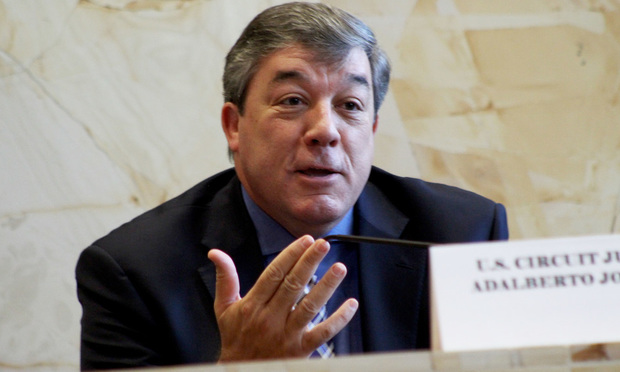$6.3M Godiva Settlement Stands in Class Dispute Over Receipts
Circuit Judge Adalberto Jordan weighed in to say a class action attorney may lack standing to challenge the lead plaintiff's standing.
October 04, 2018 at 06:17 PM
5 minute read
The original version of this story was published on Daily Report
 Judge Adalberto Jordan of the U.S. Court of Appeals for the Eleventh Circuit. Photo: J. Albert Diaz/ALM
Judge Adalberto Jordan of the U.S. Court of Appeals for the Eleventh Circuit. Photo: J. Albert Diaz/ALM
A judge used the word trifle to describe the damage done when Godiva Chocolatier Inc. let too many numbers show on receipts for truffles and other treats, but the resulting class action will still cost the candymaker $6.3 million.
In a ruling from the U.S. Court of Appeals for the Eleventh Circuit in Atlanta, objectors lost their challenge to the settlement of a South Florida class action lawsuit over the elevated risk of identity theft when retailers allow more than the last four digits of payment cards to be printed on receipts.
On the losing side are class members James Price and Eric Isaacson, who objected to the $2.1 million in legal fees and the $100,000 incentive award for the lead plaintiff, Dr. David Muransky. They argued Muransky had no standing to collect the fee because he suffered no actual harm since his identity was not actually stolen.
Judge Beverly Martin wrote the 38-page opinion affirming the settlement approved by U.S. District Judge William Dimitrouleas under the “card truncation duties” of the federal Fair and Accurate Credit Transactions Act.
“In the context of FACTA, Dr. Muransky suffered a concrete injury when Godiva provided him with a receipt containing his untruncated credit card number, and he had to 'shoulder the cost' of protecting it,” Martin said. “Time spent safely disposing of or keeping the untruncated receipt is, of course, a small injury, but it is enough for standing purposes.”
“The Supreme Court has rejected the argument that an injury must be significant; a small injury, an identifiable trifle, is sufficient to confer standing,” Martin ruled. “Thus, when Godiva unlawfully gave an untruncated receipt to Dr. Muransky, he suffered the concrete injury of shouldering the cost of safely keeping or destroying the receipt.”
Martin was joined by Eleventh Circuit Judge Adalberto Jordan and Judge Douglas Ginsburg of the U.S. Court of Appeals for the D.C. Circuit, sitting by designation.
But Jordan also provided a five-page special concurrence to make a point that seemed academic but important. He said Isaacson may lack standing to challenge Muransky's standing. In other words, if Isaacson had won, he would have lost by his own argument.
Isaacson argued Muransky lacked standing to collect the incentive award because he didn't go to all that much trouble and didn't have any real damages since his identity was never stolen.
“According to Mr. Isaacson — who happens to be a plaintiffs class-action attorney — Dr. Muransky did not suffer an injury that allows him to bring a claim under FACTA because he failed “to allege that his credit suffered when he was handed a receipt with a few extra digits, or that anyone else knew of the violation or was in a position to take advantage of it to his injury',” Jordan said.
In addition to quoting Isaacson's brief, the judge quoted a recent law review article Isaacson wrote, saying: “I was troubled by the notion that a class representative who suffered no injury should be able to evade the burden of demonstrating his own Article III standing.”
Jordan said he did not question Isaacson's sincerity, just his standing under the same federal law.
“Stated differently, if Mr. Isaacson prevailed on his standing argument, I do not see how we could redress any injury he has suffered,” Jordan said. “Indeed, Mr. Isaacson will cause himself injury if he succeeds because his monetary recovery—along with that of every class member—will be wiped out.”
Isaacson said he believes the case could have been worth much more if it had gone to trial and the $100,000 incentive award created a conflict of interest for Muransky to favor settlement.
Commenting on Jordan's opinion, Isaacson said, “It strikes me as strange.” He said members of the class who suffer identity theft and harm to their credit will incur far more in damages than they will collect from the settlement. He said he is considering asking for en banc rehearing.
Isaacson represented himself at oral arguments. Michael Hilicki of Keogh Law in Chicago spoke for Muransky. David Almeida of Benesch Friedlander Coplan & Aronoff in Chicago argued for Godiva. Hilicki and Almeida could not be reached immediately.
Martin concluded Muransky's incentive award would not make much difference in what Isaacson and others collect from the class action.
“By our calculation, Dr. Muransky's incentive award had little impact on the class members' recovery,” Martin said in a final footnote. “Assuming 48,000 class members submitted valid claims (a high-end approximation) for the $4.2 million in the fund for distribution, Dr. Muransky's incentive award of $10,000 resulted in a reduction of about 21 cents in the recovery of the class members who filed claims ($87.50 vs. $87.29).”
That would be enough to buy a 36-piece gift box of Godiva Signature Classic Truffles — $78 plus tax.
This content has been archived. It is available through our partners, LexisNexis® and Bloomberg Law.
To view this content, please continue to their sites.
Not a Lexis Subscriber?
Subscribe Now
Not a Bloomberg Law Subscriber?
Subscribe Now
NOT FOR REPRINT
© 2025 ALM Global, LLC, All Rights Reserved. Request academic re-use from www.copyright.com. All other uses, submit a request to [email protected]. For more information visit Asset & Logo Licensing.
You Might Like
View All


U.S. Eleventh Circuit Remands Helms-Burton Trafficking Case Involving Confiscated Cuban Port
3 minute read
Miami Lawyer Guilty of Indirect Criminal Contempt But Dodges Paying Legal Fees
4 minute readTrending Stories
- 1'It's Not Going to Be Pretty': PayPal, Capital One Face Novel Class Actions Over 'Poaching' Commissions Owed Influencers
- 211th Circuit Rejects Trump's Emergency Request as DOJ Prepares to Release Special Counsel's Final Report
- 3Supreme Court Takes Up Challenge to ACA Task Force
- 4'Tragedy of Unspeakable Proportions:' Could Edison, DWP, Face Lawsuits Over LA Wildfires?
- 5Meta Pulls Plug on DEI Programs
Who Got The Work
Michael G. Bongiorno, Andrew Scott Dulberg and Elizabeth E. Driscoll from Wilmer Cutler Pickering Hale and Dorr have stepped in to represent Symbotic Inc., an A.I.-enabled technology platform that focuses on increasing supply chain efficiency, and other defendants in a pending shareholder derivative lawsuit. The case, filed Oct. 2 in Massachusetts District Court by the Brown Law Firm on behalf of Stephen Austen, accuses certain officers and directors of misleading investors in regard to Symbotic's potential for margin growth by failing to disclose that the company was not equipped to timely deploy its systems or manage expenses through project delays. The case, assigned to U.S. District Judge Nathaniel M. Gorton, is 1:24-cv-12522, Austen v. Cohen et al.
Who Got The Work
Edmund Polubinski and Marie Killmond of Davis Polk & Wardwell have entered appearances for data platform software development company MongoDB and other defendants in a pending shareholder derivative lawsuit. The action, filed Oct. 7 in New York Southern District Court by the Brown Law Firm, accuses the company's directors and/or officers of falsely expressing confidence in the company’s restructuring of its sales incentive plan and downplaying the severity of decreases in its upfront commitments. The case is 1:24-cv-07594, Roy v. Ittycheria et al.
Who Got The Work
Amy O. Bruchs and Kurt F. Ellison of Michael Best & Friedrich have entered appearances for Epic Systems Corp. in a pending employment discrimination lawsuit. The suit was filed Sept. 7 in Wisconsin Western District Court by Levine Eisberner LLC and Siri & Glimstad on behalf of a project manager who claims that he was wrongfully terminated after applying for a religious exemption to the defendant's COVID-19 vaccine mandate. The case, assigned to U.S. Magistrate Judge Anita Marie Boor, is 3:24-cv-00630, Secker, Nathan v. Epic Systems Corporation.
Who Got The Work
David X. Sullivan, Thomas J. Finn and Gregory A. Hall from McCarter & English have entered appearances for Sunrun Installation Services in a pending civil rights lawsuit. The complaint was filed Sept. 4 in Connecticut District Court by attorney Robert M. Berke on behalf of former employee George Edward Steins, who was arrested and charged with employing an unregistered home improvement salesperson. The complaint alleges that had Sunrun informed the Connecticut Department of Consumer Protection that the plaintiff's employment had ended in 2017 and that he no longer held Sunrun's home improvement contractor license, he would not have been hit with charges, which were dismissed in May 2024. The case, assigned to U.S. District Judge Jeffrey A. Meyer, is 3:24-cv-01423, Steins v. Sunrun, Inc. et al.
Who Got The Work
Greenberg Traurig shareholder Joshua L. Raskin has entered an appearance for boohoo.com UK Ltd. in a pending patent infringement lawsuit. The suit, filed Sept. 3 in Texas Eastern District Court by Rozier Hardt McDonough on behalf of Alto Dynamics, asserts five patents related to an online shopping platform. The case, assigned to U.S. District Judge Rodney Gilstrap, is 2:24-cv-00719, Alto Dynamics, LLC v. boohoo.com UK Limited.
Featured Firms
Law Offices of Gary Martin Hays & Associates, P.C.
(470) 294-1674
Law Offices of Mark E. Salomone
(857) 444-6468
Smith & Hassler
(713) 739-1250






